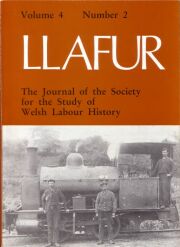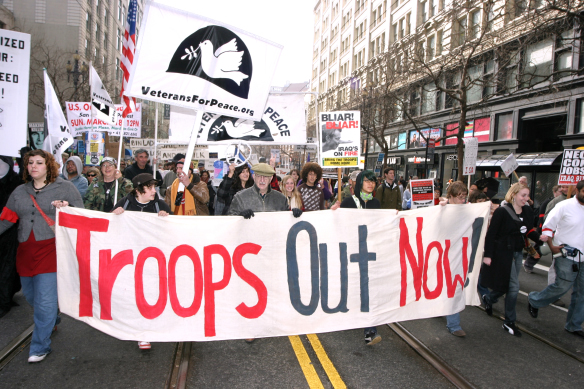 A report of the recent day school on Robert Owen & The Co-operative Movement, hosted by the Welsh People's History Society, Llafur by Anna Guevara from the LEFT Alternative.
A report of the recent day school on Robert Owen & The Co-operative Movement, hosted by the Welsh People's History Society, Llafur by Anna Guevara from the LEFT Alternative.With an early autumn monsoon and swathes of South Wales flooded, we were fearful that the day school on "Robert Owen and the Co-operative Movement", might be rained off, especially with the venue – Pontypridd Museum – being perilously close to a river . . .
Fortunately, the event went ahead as planned, and around 40 people’s remembrancers crammed into a basement hall to hear a series of papers and presentations on 150 years of the co-operative movement in Wales from the Chartists to Tower Colliery. The day school was opened with two enjoyable and stimulating papers by Bryan Davies of Pontypridd Museum, and Llafur stalwart, Alun Burge, both demolishing the generally held belief that the first co-operative in Wales was at Cwmbach – We were to learn that morning, that the Cwmbach co-op was neither the first, nor the second, third, fourth or fifth co-operative in Wales. We discovered that neither were the Rochdale Pioneers the first co-operative in Britain. Instead we heard a fascinating story of how working class rebels linked with the Chartist movement launched the first co-ops because town-shopkeepers were hostile to their politics. This forgotten history of Chartist Co-operatives was one that Llafur promised to do more future research on.
The story of the first co-operative in Wales at Pontypridd is to be found in the pages of the Northern Star, the radical newspaper that played the role of organiser in the Chartist movement. We heard of a co-operative that could not get groceries from local wholesalers who refused to sell to the radicals, and enquired for information on wholesalers further afield. The co-operative was also subject to attempts at sabotage from the local tradespeople and town councillors. The Chartists linked with the co-op met in a local beer-house, ostensibly for Welsh lessons, but the police expected more subversive purposes – though historical information is scarce due to the insurgents taking the traditional collective oath of secrecy.
What was especially inspiring was how these early co-operatives were closely interlinked with the beginnings of militant trade unionism and political agitation, and essentially formed self-help organisations set up by the most politically conscious workers at the time. Historians argue that the Pontypridd co-op failed because it went bankrupt through extending too much credit to striking train workers at Brown-Lennox, a similar story was told about the Cwmbach co-op, that it went out of business through overfunding the 1921 miners lockout, indeed, the co-op effectively funded the lockout.
A key figure in the Pontypridd Co-op was a radical Doctor and Chartist leader named William Price, A whole book could be written about Price (and probably has!), an early pioneer of cremation who played a role in laying the ground for the final legalisation of the practice in 1902, he was also a druid and an advocate of free love.
Dr Price can also be seen as a father of socialised medicine: Elected doctor by striking workers who paid weekly contributions in return for free health care, he caustically commented that people paid for doctors when they were sick, but that people should only pay for doctors when they had been cured, and when they were sick the doctors should pay the patients!
An interesting angle was opened up, when we heard about the influence of Iolo Morganwg, stonemason and inventor of the modern bards, on Price and Welsh chartists. It was argued that Morganwg bequeathed Welsh radicals the equivalent of the English concept of “the Norman Yoke” (read Christopher Hill for background on this idea). The Welsh couldn’t look back to a golden age before the Norman conquest of justice because they had never been conquered by the Normans!
Iolo, “The bard of liberty”, invented a fiction of a radical and democratic druidic past long before the Roman invasion of Britain, a distant Welsh or British utopia, presided over by Druids who were lawgivers and moral teachers, a fiction was promoted that in the Middle Ages, Welsh Kings were appointed and removed by popular assembly. William Price believed that this utopian past could fire people's imaginations to create a radical present.
We heard anecdotes that Iolo's Triads of the Social State had even influenced Karl Marx, and it was argued that Iolo had shaped many false ideas that people had of medieval Welsh history, speakers argued that people had read the Laws of Hywel Dda through the prism of Iolo’s preface that gave them a democratic and egalitarian twist that wasn’t really there: For example a group of 19th century squatters invoked in their defence the laws of Hywel Dda, but it was claimed that they had inherited a false and romantic idea of the laws.
This inspired much controversy with the floor, especially when the speaker raised the issue of Welsh suffragettes claiming inspiration from Celtic women who supposedly enjoyed equality as an example of how a completely romanticised view of the laws had developed. Some argued that Hywel Dda’s laws were progressive particularly in regards to divorce and defended them as an egalitarian system of law.
Other presentations were concerned with Robert Owen, needs no introduction from us, except to say that the verdict is still open on whether he was a utopian socialist or an enlightened capitalist. Certainly he was a pioneer of adult education and nursery education, and defender of childrens rights, and pioneered reforms such as sick pay, but my own gut feeling is that he belongs to the prehistory of the working class movement.
The conference ended with a discussion of the relevance of co-operative movement today. A paper promoting co-operative schools stimulated discussion, while one speaker from the floor bitterly commented that some co-ops treated their workers just as shoddily as capitalist firms. Others saw the co-operative as offering a model for self-help and decentralised alternative to top-down socialism. While a few implied that Owenites were middle class do-gooders and paternalistic. Another debate hinged on ‘nationalisation’ and the nature of public ownership. People argued that their needed to be some grassroots form of public ownership based on democratic and community control, leading to a general debate on what socialism should be in Century 21.
Llafur is to be commended on organising an enjoyable and educational conference. The next event will be a day school History of Welsh Sport at the SWALEC Stadium, Cardiff on the 1st November. The event is free. Contact Siân Williams s.f.williams@swansea.ac.uk to book your place. Another day school on gender and sport will take place in Cardiff in November.















No comments:
Post a Comment